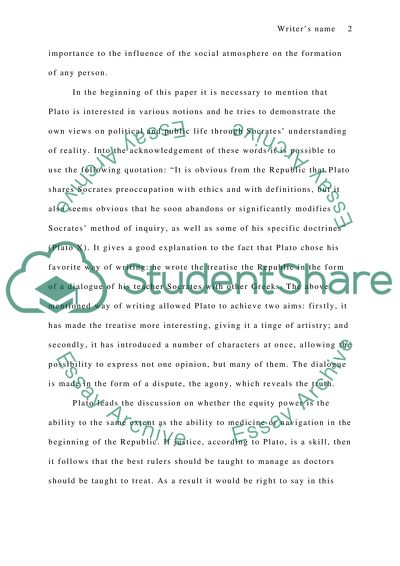Cite this document
(“In THE APOLOGY, Socrates is charged with corrupting the youth. Relying Essay”, n.d.)
In THE APOLOGY, Socrates is charged with corrupting the youth. Relying Essay. Retrieved from https://studentshare.org/philosophy/1580228-in-the-apology-socrates-is-charged-with-corrupting-the-youth-relying-upon-your-reading-of-platos-republic-write-an-essay-in-which-you-either-defend-socrates-or-provide-support-to-the-city-of-athens-in-bringing-this-charge
In THE APOLOGY, Socrates is charged with corrupting the youth. Relying Essay. Retrieved from https://studentshare.org/philosophy/1580228-in-the-apology-socrates-is-charged-with-corrupting-the-youth-relying-upon-your-reading-of-platos-republic-write-an-essay-in-which-you-either-defend-socrates-or-provide-support-to-the-city-of-athens-in-bringing-this-charge
(In THE APOLOGY, Socrates Is Charged With Corrupting the Youth. Relying Essay)
In THE APOLOGY, Socrates Is Charged With Corrupting the Youth. Relying Essay. https://studentshare.org/philosophy/1580228-in-the-apology-socrates-is-charged-with-corrupting-the-youth-relying-upon-your-reading-of-platos-republic-write-an-essay-in-which-you-either-defend-socrates-or-provide-support-to-the-city-of-athens-in-bringing-this-charge.
In THE APOLOGY, Socrates Is Charged With Corrupting the Youth. Relying Essay. https://studentshare.org/philosophy/1580228-in-the-apology-socrates-is-charged-with-corrupting-the-youth-relying-upon-your-reading-of-platos-republic-write-an-essay-in-which-you-either-defend-socrates-or-provide-support-to-the-city-of-athens-in-bringing-this-charge.
“In THE APOLOGY, Socrates Is Charged With Corrupting the Youth. Relying Essay”, n.d. https://studentshare.org/philosophy/1580228-in-the-apology-socrates-is-charged-with-corrupting-the-youth-relying-upon-your-reading-of-platos-republic-write-an-essay-in-which-you-either-defend-socrates-or-provide-support-to-the-city-of-athens-in-bringing-this-charge.


